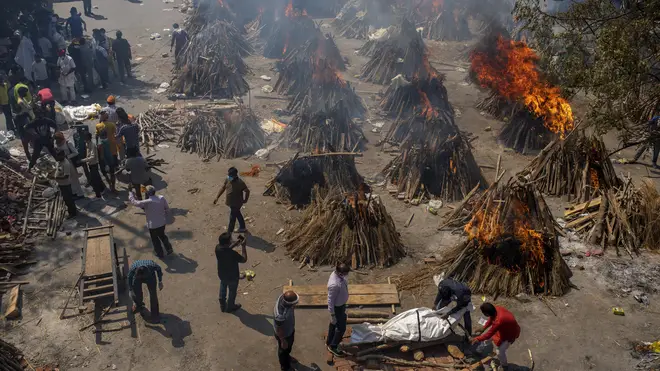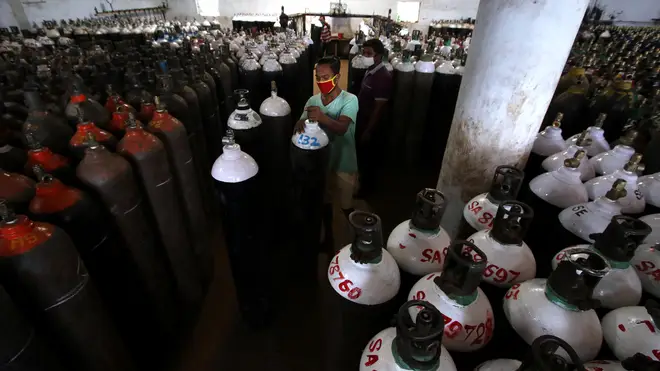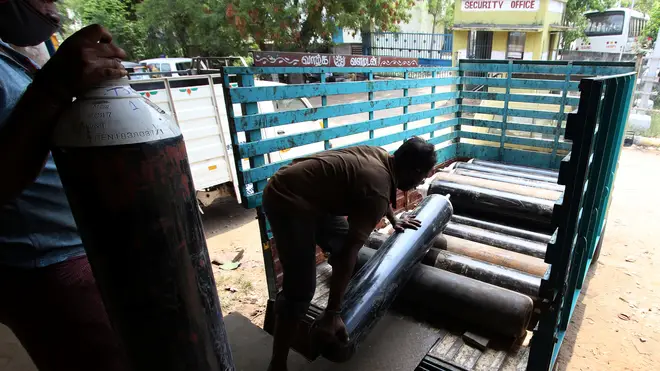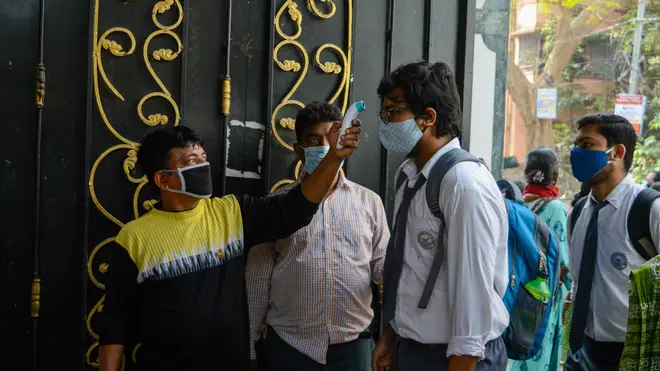
Nick Ferrari 7am - 10am
25 April 2021, 07:04 | Updated: 25 April 2021, 09:27

India's crematoria and burial grounds are being overwhelmed by the devastating new surge of coronavirus infections tearing through the country, as hospitals struggle to keep up with the demand for oxygen.
For the fourth straight day, on Sunday India set a global daily record of new infections, spurred by the emergence of a new variant that has undermined the government's premature claims of victory over the pandemic.
The 349,691 confirmed cases over the past day took India's total to more than 16.9 million, behind only the United States.
The Health Ministry reported another 2,767 deaths in the past 24 hours, pushing India's Covid-19 fatalities to 192,311.
Read more: Indian variant - Vaccines 'no longer going to help,' virologist warns
Read More: Caller in India shares absolute fear of Covid crisis as healthcare system buckles
Experts say that toll could be a huge undercount, as suspected cases are not included, and many deaths from the infection are being attributed to underlying conditions.
The crisis unfolding in India is most visceral in its graveyards and crematoria, and in heartbreaking images of gasping patients dying on their way to hospital due to lack of oxygen.

Burial grounds in the Indian capital, New Delhi, are running out of space and bright, glowing funeral pyres light up the night sky in other badly hit cities.
At the Bhadbhada Vishram Ghat crematorium, workers said they cremated more than 110 people on Saturday, even as government figures in the city with a population of 1.8 million put the total number of deaths at just 10.
"The virus is swallowing our city's people like a monster," said Mamtesh Sharma, an official at the site.
The unprecedented rush of bodies has forced the crematorium to abandon individual ceremonies and rituals that Hindus believe release the soul from the cycle of rebirth.
"We are just burning bodies as they arrive," said Mr Sharma. "It is as if we are in the middle of a war."
The demand for oxygen from hospitals has nearly tripled to 8,000 metric tons, the federal government told the Delhi High India is struggling to supply vital Oxygen supplies to those in need as the country sees more than 300,000 new cases each day during their deadly second wave.
India's total production was 7,500 metric tons of oxygen per day.
Normally healthcare services would use around 15% of this each day, but amid the crisis over 90% is being diverted to patients left gasping for breath by the virus.
Most of the country's oxygen production capacity is centred around industries, many of which are concentrated in India's eastern states, while the current surge in infections is in the northern and western states.
It is feared deaths could hit more than 5,000 each day, with both hospitals and crematoriums becoming overwhelmed by demand.

Medical volunteer explains devastating Covid situation in India
The medical oxygen shortage in the nation has become so dire that a Sikh house of worship is offering sessions with shared tanks to Covid-19 patients waiting for a hospital bed.
People are arriving in cars, on foot or by taxi, desperate for a mask and tube attached to the precious oxygen tanks outside the gurdwara in a neighbourhood near the capital, New Delhi.
Read more: UK plans support for India amid surge in Covid-19 cases
After having largely tamed the virus last year, India is in the throes of the world's worst coronavirus surge and many of the country's hospitals are struggling to cope with shortages of beds, medicines and oxygen.
The gurdwara management has promised to provide free oxygen to patients until they can be admitted to a hospital.
Teams of volunteers check oxygen levels of newly arrived patients and provide what they need.
The gurdwara started the initiative on Thursday evening, and by Friday evening had seen over 700 patients come through, reported The Hindu newspaper.

Most hospitals in India are not equipped with independent plants that generate oxygen directly for patients, primarily because they require an uninterrupted power supply, which is a rarity in many states.
As a result, hospitals typically rely on liquid oxygen, which can be stored in cylinders and transported in cryogenic tankers.
But, amid the surge, supplies in hard-hit places like New Delhi are running critically short.
Last year, India kept its hospitals sufficiently stocked by diverting oxygen from industries that were closed down by one of the world's strictest virus lockdowns.
As Indians were cooped up indoors for months, industrial tanks were repurposed for medical use and tanker trucks raced over empty motorways to transport oxygen across the vast country to hotspots.

But with the current wave, blamed on a highly contagious variant that has spread quickly and widely without the limiting benefit of a nationwide lockdown, the situation is different.
Scores have died in hospitals in India's capital amid suggestions that low oxygen supplies were to blame.
Doctors have taken to social media to beg public authorities to get them resupplied, and the government has mobilised to bring oxygen supplies by train, plane and truck.